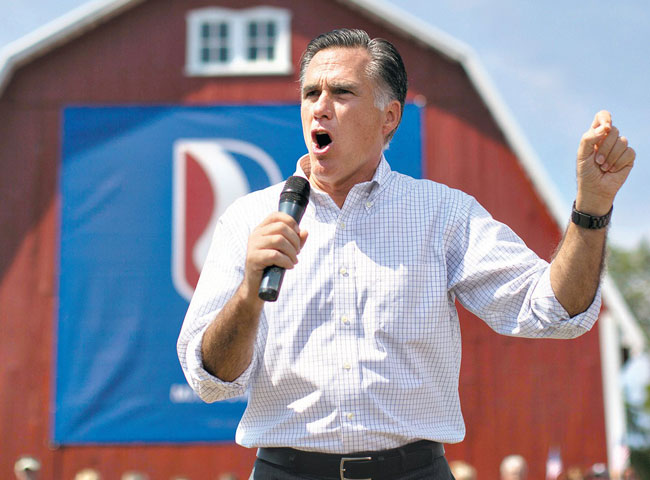Mitt’s Business, Olympic Success
If Mitt Romney were not running for president, he’d be receiving standing ovations for his leadership and success. Instead, he receives pot shots.

Mitt Romney. AP Photo.
Those who don’t understand how the private sector works in building our economy throw those shots. Those who understand that businesses are leadership training grounds, real jobs creators, incubators of innovation and top providers of our nation’s tax base are on their feet.
With the economy stuck on stop, people of all political persuasions are beginning to realize that Romney’s vast private sector experience and leadership can get us back on go. Government bureaucratic institutions just aren’t made for the job of tackling a record-breaking U.S. debt and deficit and a jobless, glacier-paced economic recovery. Private sector solutions – encourage businesses that create jobs, increase tax revenue, invigorate consumer spending – are the only way.
“…presidential politics can spin a win into a “lose” with the stroke of a quote by a few naysayers.”
These thriving companies in which Romney’s Bain Capital invested represent a huge contribution to our economy providing jobs, bringing in tax revenue, and boosting consumer spending: Dunkin Donuts, Domino’s Pizza, Burger King, AMC Entertainment, Brookstone, Burlington Coat Factory, Clear Channel Communications (KSSK for one), Domino’s Pizza, DoubleClick, D&M Holdings, Guitar Center, Hospital Corporation of America (HCA), Sealy, Sports Authority, Staples, Toys “R” Us, Warner Music Group and The Weather Channel.
(I listen to Perry and Price while stretching out on a Serta mattress as I eat my Domino’s pizza with gluten-free crust.)
Criticize him for anything, but not for being successful at turning around “business” economies.
Yes, there were failures of about 5 percent of companies Bain invested in, mirroring national business failings, but the net gain of jobs, expansion and the rarely mentioned charitable donations in the hundreds of millions made by the thriving companies deserves, well, applause.
Despite 2012’s presidential race mudslings (both sides guilty), it will take some highly dishonest political spin not to give Romney his due for one particular spectacular success: salvaging the 2002 Salt Lake City Winter Olympic Games (paid no salary for from 1999 to 2002).
A bribery scandal involving bidding for the Games brought a criminal investigation and congressional hearings, understandably spooking corporate sponsors, and sinking America’s global prestige. Romney and his team turned a spiraling debt situation into an Olympic Games that ended $100 million in the black. A Sept. 19, 2007, New York Times article wrote of Romney’s Salt Lake City Games success acknowledging his considerable skills to raise private sector money, win over “enemies” and keep focused on the goal.
Quoting from the article, “He (Romney) always has an objective in mind and a goal that he works toward,” said Randy L. Dryer, a lawyer and a former member of the Salt Lake Organizing Committee who worked closely with Romney and described himself as a Democrat, but also an admirer of Romney’s. “But he’s not unwilling to modify that objective if it’s an uphill battle and not worth the fight to get there – he is not bullheaded.”
Romney traveled across the country to win new sponsors General Mills, cer tified Angus beef and Monster.com, increasing Olympic sponsorship by $300 million, according to the article by Kirk Johnson.
But presidential politics can spin a win into a “lose” with the stroke of a quote by a few naysayers. Some complained that official pins featuring Romney as a superhero pointed to his narcissism and wanting all the “turnaround” glory. But, on a January 2012 NPR All Things Considered (Romney’s Olympic Legacy: Savior Or Self-Promoter? by Howard Berkes), Fraser Bullock, Romney’s top assistant at the Olympics, says the pins came out of the Olympic committee marketing department.
“Mitt could care less whether his face is on a pin or not,” Bullock says. “It became a very popular pin and generated revenue for the organizing committee, and that’s where he was coming from.” Bullock goes on to say that “Romney was a ‘cheapskate’ desperate to erase the $400 million operating budget deficit and restore confidence in the organizing effort.”
Our country could seriously use a president who is a “cheapskate” desperate to erase America’s budget deficit and restore its peoples’ confidence.
Or, as Martin Feldstein, professor of economics at Harvard University and president emeritus of the National Bureau of Economic Research, says:
“America’s enormous budget deficit is now exceeded as a share of national income only by Greece and Egypt among all of the world’s major countries.”





